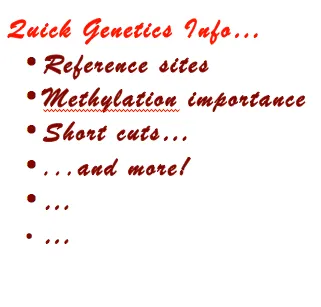
Methylation Short Cuts
Looking at 23andMe Results
- Genetic Genie, which provides key methylation and detoxification information, for a suggested donation of $15;
- MTHFRsupport.com, giving you a much longer report and pictures of the biochemical pathways, for a fee of $30;
Promethease which enables you to search your raw data with specific clinical considerations, such as “breast cancer”, and see your results and links to medical research articles on the topic, for a fee of $5; and finally- and finally Athletigen, which is free and just fun: are you a worrier or
warrier ? a better endurance or strength athlete? with links to the genes they use for their conclusions.
Research Options
There are other websites I visit to learn, and re-learn, what I need to know of the complex interactions of genetics. My favorites are:
- SNPedia.com which enables you to search any characteristic (not such a good resource) or gene location (
snp , or “snip”) and see what has been published about thatsnp , and learn more about its global distribution and health associations. - Heartfixer.com for its methylation genomics section here, the hefty and brainy work of interventional cardiologist Dr. James Roberts. He spends his morning doing cardiac surgery and evidently must not sleep because he has done lots of study and reporting, and constantly is updating, genomic information.
- Ben Lynch, ND, is the most prominent educator on the topic and he has a generous amount of his work available through the website Seeking Health. Search the website for his presentation, Improving Patient Outcomes.
Important Bottom Line
The most important thing to remember is that the process of methylation is supremely important in our bodies, happening millions of times each second, passing methyl groups as currency for everything we do. We each have two prime options for learning and optimizing this area of our bodies. Before you think “two” sounds simple, here’s what I mean:
- Remember that methylation needs, on the one hand, are increased in response to stressors and, on the other hand, require a host of co-factors only obtained by following excellent nutritional and lifestyle habits, supplementing and checking nutrient adequacy with a knowledgeable practitioner. If you can’t take the funds or the energy right now to learn more about methylation, keep attending to everything else. Eat a nutrient dense diet that you know your body likes, free of foods that cause adverse
reactions, while you’re moving actively throughout your day and sleeping well at night. Surround yourself with friends and do work that you like! - If you do have just a bit of energy to devote to methylation questions, ask your doctor to check your MTHFR and COMT genes, and your homocysteine level. While not a perfect indicator, your homocysteine level (an amino acid that needs to be in a sweet spot of 5-8) is a fair reflection of your vitamins B12 and B9 (folate), as well as your current abilities to methylate those crucial vitamins. If you have no variants and a good homocysteine level, no further reading required, go outside and play! If your MTHFR genes show any variations in either location (A1298C or C677T), you will likely benefit from some wise methyl group supplementation, see the first option below. If your COMT genes also show variations, you must go slowly with methylation and mix your B vitamins with some other forms, as in the second. If you JUST have the COMT variants, look to the third option.
- Supplement with Methylcobalamin (1 mg daily, in a sublingual or chewable form) and Pyridoxal-5-Phosphate (the active form of B6, 25-50 mg, taken at bedtime). After a week, start Methyl Folate (800 mcg or 1 mg, taken daily). Expect your homocysteine to decline slowly over 2-3 months.
- You may take the supplements listed above about half the time, but the other half of the time, switch out Methylcobalamin and take Hydroxy- or Adenosyl-B12 instead, AND switch out methyl folate and substitute Folinic acid, again about half the time.
- Your supplements would be just the non-methylated forms, so P5P, yes, and the hydroxy- or adenosyl-B12 and the Folinic Acid.
The shortcuts listed here will work just fine for most people, but definitely not all. If you follow any of the steps listed in #2 above and feel worse rather than better, stick with everything you started in #1 and wait til you can get a good consultation with someone knowledgeable before you start any methylated supplements.

